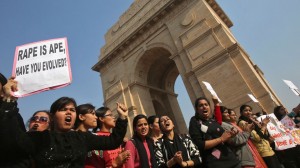A blow for India
 For women in India to walk with dignity and freedom, a social transformation as well as a change in the values, attitudes and male perceptions of women, by men and women, is needed. Dr. Kanchana Lanzet, member of the board of directors at UN Women in Bonn, gives us an expert opinion on why being a woman in India is so problematic and whether one can really do much about it. This is Dr. Lanzet’s first blog in the series.Violence against women including domestic violence, sexual assault, rape and murder of women is the one issue, which cuts across all boundaries of caste, class, race, ethnicity, ideologies and religion.
For women in India to walk with dignity and freedom, a social transformation as well as a change in the values, attitudes and male perceptions of women, by men and women, is needed. Dr. Kanchana Lanzet, member of the board of directors at UN Women in Bonn, gives us an expert opinion on why being a woman in India is so problematic and whether one can really do much about it. This is Dr. Lanzet’s first blog in the series.Violence against women including domestic violence, sexual assault, rape and murder of women is the one issue, which cuts across all boundaries of caste, class, race, ethnicity, ideologies and religion.
Sexual assault and rape is also against human rights. What we have witnessed and continue to witness, how India treats her women is only the tip of the iceberg of the rot and corruption prevalent in the country. Patriarchy, domination by men and corruption at all levels has been the reasons for the brutal rape and sadistic torture of the 23-year-old young woman named Jyoti who had her whole beautiful life in front of her.
For the nation it is a blow in its solar plexus. Sad as it may be, the young woman’s ‘martyrdom’ has triggered off a nationwide awakening to atrocities of all kinds including rape, which Indian girls and women are confronted with. If the progress of a country were to be measured by the status of women in its society and the manner in which it treats its women, where would India stand today?
Sexual assault and rape are used as planned strategies against women not only in regions of armed conflict across international borders, as in the great lakes area of Eastern Africa but also within sovereign nations. In India one has to only take a look at Manipur or Kashmir where women are subject to sexual violence and rape by the Indian army. In tribal areas, for example Chattisgarh, tribal women experience a similar fate by the special police. The hills of Chattisgarh are rich in mineral resources and are coveted by transnational companies and the tribals fight to protect their rights and their land. Many a woman staff of non-governmental development Organisations, working in villages and in tribal areas, are raped by landlords to teach them a lesson and prevent them from interfereing with the local way of life: that is, to not disturb the power balance.
I remember one wall-poster used to explain the circumstances leading to domestic violence among the landless agricultural laborers which depicted the landlord beating his worker. The worker who is in a position of disadvantage bows his head meekly. Nevertheless he is outraged because he is powerless to stand up to the landlord. He goes home and beats his wife who in turn beats the child. The child goes out and throws a stone at the dog out on the street! In this chain reaction to frustration, we very clearly see how the dominant exercise their
powers over those who are in a vulnerable position and often do not have the power to object and protest and thus sexual assault and rape can become an exercise of dominance.
In the West news items, TV talk shows and blogs have tried to explain the question as to how such a heinous crime could take place in the capital in one of the world’s rising economies. Tradition versus modernity, patriarchal values, caste, unemployment, misogyny and male dominance or religion are often highlighted in TV interviews and talk shows, blogs, facebook, twitter and so on.
Indians know better, it is all of these and much more. It is above all a crisis of values as a result of modernisation and westernisation. History has shown us in moments of crisis, women pay the price. So if it is complex, let’s have a look at it, not shy away from it and approach what must be done with vigour.
Author: Kanchana Lanzet
Editor: Manasi Gopalakrishnan
Coming up in the series…






